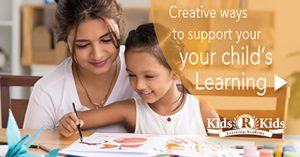Learning in early childhood seems to happen at amazing speed. Babies seem to know how to communicate by crying from birth. Soon they are smiling to indicate happiness. At the toddler stage, they’re on the move, exploring their surroundings. Some behaviors appear to develop “naturally,” like crawling, walking, eating, and laughing.

At a certain stage of development, the best results are produced by research-based strategic planning by trained professionals. But even after children enter a more formal educational setting, parents have an important role to play.
Supporting Structured Learning
- Talk to your child’s daycare center, childcare provider, or preschool about their curriculum. Ask educators for ideas you can use at home to reinforce the formal learning experience. If your child is learning a new skill or language, create opportunities at home for them to demonstrate and practice what they’re learning.
- Ask your child open-ended questions about their feelings and thoughts. Some examples are:
What did you learn in preschool today?
Why do you think that person did that?
Do you like this? Why? (or ”Why not?”)The goal is to help your child reason and communicate as a continuous, everyday process.
- Think of everyday activities as opportunities to teach and learn. If you are preparing a meal, show your preschooler how to measure ingredients. If you are taking a trip, invite your child to look at pictures of your destination and to listen as you plan.
Learning Happens All the Time
Your child is always learning from their environment, at home, school, or any other place. By keeping their needs in mind, you can reinforce the structured content presented by teachers. These combined efforts can give infants, toddlers, and preschoolers a significant advantage that can last throughout their entire education.
When parents are involved in the educational process, children are more likely to think of learning as a positive experience. You can help to make your child’s education outside of preschool exciting and fun.